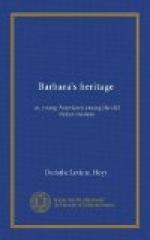Meanwhile Margery was saying to her mother:—
“How pleasant it is to have everybody so happy!”
“Yes, dear. Do you know why I am so very happy?” and as Margery shook her head, her mother told her that her Uncle Robert had decided to go home to America, and that never again would he live abroad.
“It is more like a story than truth. Uncle to go home, and Barbara to be his wife! You did not think, did you, mamma, what would come from our year in Italy? Just think! Suppose you had not asked Barbara and Betty to come with us! What then?”
“That is too bewildering a question for you to trouble yourself with, my child. There is no end to that kind of reasoning.
“And,” she added gently, “it is not a question that Faith would ask. The only truth is that God was leading me in a way I did not know, and for ends I could not foresee. That which I did from a feeling of pure love for my dear neighbors and friends was destined to bring me the one great blessing I had longed for during many years. Oh! it does seem too good to be true that Robert is so happy, and that he is coming home.”
And for the seventieth-times-seven time Mrs. Douglas breathed a silent thanksgiving as she heard the approaching footsteps of her brother.
For Barbara and Robert Sumner the last days spent in Venice were filled with a peculiar joy. The revulsion of feeling, the unexpected, despaired-of happiness, the untrammelled intercourse, the full sympathy of those dear to them,—all this could be experienced but once.
Only one person was out of tune with the general feeling. This was Lucile Sherman. She returned a polite note in reply to that which Mrs. Douglas had at once sent her containing information of her brother’s engagement to Barbara. In it she wrote that her friends had very suddenly decided to leave Venice for the Tyrol, and she must be content to go with them without even coming to say good-by and to offer, in person, her congratulations. Mrs. Douglas at first thought of going to her, if but for a moment; then decided that perhaps it would be best to let it be as she had so evidently chosen.
In a few days they also left Venice,—for Milan, stopping on the way for a day or two at Padua. They were to visit this city chiefly for the purpose of seeing Giotto’s frescoes in the Arena Chapel, and Mantegna’s in the Eremitani, although, as Mr. Sumner said, the gray old city is well worth a visit for many other reasons. The antiquity of its origin, which its citizens are proud to refer to Antenor, the mythical King of Troy, accounts for the thoroughly venerable appearance of some quarters. It is difficult, however, to believe that it was ever the wealthiest city in upper Italy, as it is reported to have been under the reign of Augustus. During the Middle Ages it was one of the most famous of European seats of learning. Dante spent several years in Padua after his banishment from Florence, and Petrarch once lived here. All these things had been talked over before they alighted at the station, and, driving through one of the gates of the city, went to their hotel.




